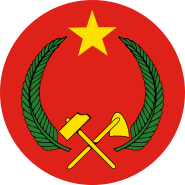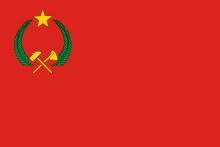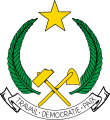People's Republic of the Congo
The People's Republic of the Congo (French: République populaire du Congo) was a Marxist–Leninist one-party socialist state that was established in 1969[2] in the Republic of the Congo. Led by the Congolese Party of Labour (French: Parti congolais du travail, PCT), it existed until 1991 when, following the dissolution of the Soviet Union, the country's earlier name was restored and André Milongo was named transitional prime minister.
People's Republic of the Congo République Populaire du Congo (French) | |||||||||
|---|---|---|---|---|---|---|---|---|---|
| 1969–1992 | |||||||||
Anthem: Les Trois Glorieuses | |||||||||
.svg.png) | |||||||||
| Capital | Brazzaville | ||||||||
| Common languages | French | ||||||||
| Government | Unitary Marxist-Leninist one-party socialist republic | ||||||||
| Head of State | |||||||||
• 1970–1977 | Marien Ngouabi | ||||||||
• 1977–1979 | Joachim Yhombi-Opango | ||||||||
• 1979–1992 | Denis Sassou-Nguesso | ||||||||
| Prime Minister | |||||||||
• 1973–1975 | Henri Lopès (first) | ||||||||
• 1991–1992 | André Milongo (last) | ||||||||
| Historical era | Cold War | ||||||||
• Established | 31 January 1969 | ||||||||
• Disestablished | 1992 | ||||||||
| Currency | CFA franc (XAF) | ||||||||
| Calling code | 242 | ||||||||
| ISO 3166 code | CG | ||||||||
| |||||||||
| Today part of | |||||||||
Part of a series on the |
||||||||||||||||||||||||||||||||||||
|---|---|---|---|---|---|---|---|---|---|---|---|---|---|---|---|---|---|---|---|---|---|---|---|---|---|---|---|---|---|---|---|---|---|---|---|---|
| History of the Republic of the Congo |
||||||||||||||||||||||||||||||||||||
 | ||||||||||||||||||||||||||||||||||||
|
||||||||||||||||||||||||||||||||||||
|
| ||||||||||||||||||||||||||||||||||||
Demographics
The People's Republic of the Congo had 2,153,685 inhabitants in 1988. There were 15 ethnic groups, although most people were Kongo, Sangha, M'Bochi, or Teke. 8,500 Europeans were present as well, mostly of French extraction. French was the official language, but other recognized languages included Kikongo and Lingala. Most of the population was centered in urban areas such as Brazzaville. Literacy was 80%, but infant mortality was also high.
History
Background
Alphonse Massamba-Débat, who became the president of the Republic of the Congo in 1963, was the first African head of state who proclaimed himself openly a Marxist. He established a single party system in 1964 around his own political group, the National Revolution Movement (Mouvement National de la Révolution). Massamba-Débat was elected Secretary General of the National Revolution Movement while Ambroise Noumazalaye became its First Secretary. The Congolese single party was backed by a well-armed popular militia, the Défense Civile, headed by Ange Diawara. However, by 1968 mounting protests led Massamba-Débat to imprison one of its leaders, Captain Marien Ngouabi.[3]
Proclamation
Seeing that the militant leftist opposition was not giving up, Massamba-Débat ended up yielding and proclaimed an amnesty, freeing Marien Ngouabi, among other political prisoners in mid 1968. Following the amnesty Massamba-Débat relinquished his power in September giving way to a period of instability. Finally on 31 December 1968 Marien Ngouabi became the head of state. The new leader officially proclaimed a Socialist-oriented state in the form of a "Popular Republic" on 31 January 1969. The administration became strongly centralized in Brazzaville and the main government posts were taken over by Congolese Workers' Party —Parti congolais du travail (PCT)— cadres after abolishing the national assembly of the previous republic. The Marxist-Leninist PCT held a constitutive congress in the capital from 29 to 31 December 1969, becoming the sole party of the new state. Marien Ngouabi further introduced a number of communist policies —such as nationalizing the means of production— in the succeeding years. Ngouabi was assassinated in 1977 and was succeeded by colonel Joachim Yhombi-Opango, who ruled until February 1979, when Denis Sassou-Nguesso rose to power.[3]
In the same manner as other African communist states of the Cold War era, the People's Republic of the Congo shared close ties with the Soviet Union.[4] This association remained strong after Ngouabi's assassination in 1977. However, the PCT government also maintained a close relationship with France throughout its existence.[5]
Transition
In mid-1991, the Sovereign National Conference removed the word populaire ("People's") from the country's official name, while also replacing the flag and anthem that had been used under the PCT government. The Sovereign National Conference ended the PCT government, appointing a transitional Prime Minister, André Milongo, who was invested with executive powers. President Denis Sassou Nguesso was allowed to remain in office in a ceremonial capacity during the transitional period.[6]
Events and emblems

 A PR Congo delegation during an official visit to East Germany (1982).
A PR Congo delegation during an official visit to East Germany (1982)..svg.png) Flag of the PR Congo Army (1970–1992).
Flag of the PR Congo Army (1970–1992). Roundel of the PRC Air Force (1970–1990).
Roundel of the PRC Air Force (1970–1990).
References
- As shown on the coat of arms
- Decalo, S. 1990. Coups and Army Rule in Africa. New Haven: Yale, 39
- Albert M'Paka, Démocratie et administration au Congo-Brazzaville, L'Harmattan, 2005, pp. 181-182
- Timeline: Republic of the Congo
- John F. Clark, "Congo: Transition and the Struggle to Consolidate", in Political Reform in Francophone Africa (1997), ed. John F. Clark and David E. Gardinier, page 65.
- Clark, "Congo: Transition and the Struggle to Consolidate", page 69.
External links


